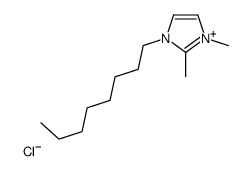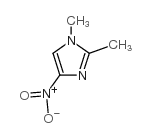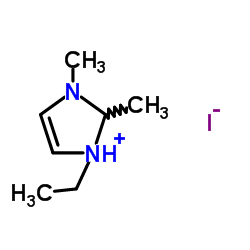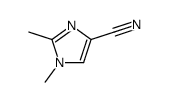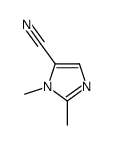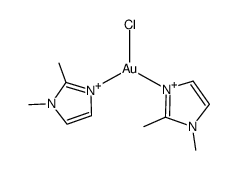1739-84-0
| 中文名 | 1,2-二甲基咪唑 |
|---|---|
| 英文名 | 1,2-Dimethylimidazole |
| 中文别名 |
1,2-二甲基-1H-咪唑
N,2-二甲基咪唑 1,2-二甲咪唑 |
| 英文别名 |
dimethylglyoxaline
dimethylimidazole 1,2-DiMethyliMidazo Imidazole, 1,2-dimethyl- (8CI) 1,2-Dimethylimdazole 1,2-Dimethyl-1H-imidazole 2,3-dimethylimidazole bis-methylimidazole 1H-Imidazole, 1,2-dimethyl- EINECS 217-101-2 MFCD00005294 N,2-DIMETHYLIMIDAZOLE UNII-Q41BC3GRJB 1,2-Dimethylimidazol 1,2-dimethyl-1h-imidazol 1,2-dimethyl imidazole |
| 密度 | 1.0±0.1 g/cm3 |
|---|---|
| 沸点 | 206.0±0.0 °C at 760 mmHg |
| 熔点 | 37-39 °C(lit.) |
| 分子式 | C5H8N2 |
| 分子量 | 96.130 |
| 闪点 | 73.0±18.7 °C |
| 精确质量 | 96.068748 |
| PSA | 17.82000 |
| LogP | -0.13 |
| 外观性状 | 透明至白色固体 |
| 蒸汽压 | 0.3±0.3 mmHg at 25°C |
| 折射率 | 1.519 |
| 储存条件 | 保持容器密封,储存在阴凉,干燥的地方 |
| 稳定性 | 常温常压下稳定,避免氧化物接触 |
| 分子结构 | 1、 摩尔折射率:29.67 2、 摩尔体积(m3/mol):97.7 3、 等张比容(90.2K):231.4 4、 表面张力(dyne/cm):31.3 5、 介电常数(F/m):无可用 6、 极化率(10 -24cm 3):11.76 |
| 计算化学 | 1.疏水参数计算参考值(XlogP):0.4 2.氢键供体数量:0 3.氢键受体数量:1 4.可旋转化学键数量:0 5.互变异构体数量:无 6.拓扑分子极性表面积17.8 7.重原子数量:7 8.表面电荷:0 9.复杂度:63.1 10.同位素原子数量:0 11.确定原子立构中心数量:0 12.不确定原子立构中心数量:0 13.确定化学键立构中心数量:0 14.不确定化学键立构中心数量:0 15.共价键单元数量:1 |
| 更多 | 1. 性状:白色棱状晶体。 2. 密度(g/mL,25/4℃): 1.084 3. 相对蒸汽密度(g/mL,空气=1):未确定 4. 熔点(ºC):37-39 5. 沸点(ºC,常压):204 6. 沸点(ºC,5.2kPa): 未确定 7. 折射率: 1.4945 8. 闪点(ºC): 92 9. 比旋光度(º): 未确定 10. 自燃点或引燃温度(ºC):未确定 11. 蒸气压(kPa,25ºC): 0.35 12. 饱和蒸气压(kPa,60ºC): 未确定 13. 燃烧热(KJ/mol):42.4 14. 临界温度(ºC): 未确定 15. 临界压力(KPa): 6.24 16. 油水(辛醇/水)分配系数的对数值: -0.13 17. 爆炸上限(%,V/V):未确定 18. 爆炸下限(%,V/V): 未确定 19. 溶解性:溶于水。 |
Synonym:None Section 2 - COMPOSITION, INFORMATION ON INGREDIENTS
Risk Phrases: 34 Section 3 - HAZARDS IDENTIFICATION EMERGENCY OVERVIEW
Causes burns. Potential Health Effects Eye: Causes eye burns. Skin: Causes skin burns. Ingestion: May cause severe and permanent damage to the digestive tract. Causes gastrointestinal tract burns. Inhalation: Causes chemical burns to the respiratory tract. Chronic: No information found. Section 4 - FIRST AID MEASURES Eyes: In case of contact, immediately flush eyes with plenty of water for at least 15 minutes. Get medical aid immediately. Skin: In case of contact, immediately flush skin with plenty of water for at least 15 minutes while removing contaminated clothing and shoes. Get medical aid immediately. Wash clothing before reuse. Ingestion: If swallowed, do NOT induce vomiting. Get medical aid immediately. If victim is fully conscious, give a cupful of water. Never give anything by mouth to an unconscious person. Inhalation: If inhaled, remove to fresh air. If not breathing, give artificial respiration. If breathing is difficult, give oxygen. Get medical aid. Notes to Physician: Treat symptomatically and supportively. Section 5 - FIRE FIGHTING MEASURES General Information: As in any fire, wear a self-contained breathing apparatus in pressure-demand, MSHA/NIOSH (approved or equivalent), and full protective gear. During a fire, irritating and highly toxic gases may be generated by thermal decomposition or combustion. Combustible liquid and vapor. Extinguishing Media: In case of fire, use water, dry chemical, chemical foam, or alcohol-resistant foam. Section 6 - ACCIDENTAL RELEASE MEASURES General Information: Use proper personal protective equipment as indicated in Section 8. Spills/Leaks: Clean up spills immediately, observing precautions in the Protective Equipment section. Sweep up, then place into a suitable container for disposal. Avoid generating dusty conditions. Remove all sources of ignition. Provide ventilation. Section 7 - HANDLING and STORAGE Handling: Wash thoroughly after handling. Remove contaminated clothing and wash before reuse. Use with adequate ventilation. Minimize dust generation and accumulation. Do not get in eyes, on skin, or on clothing. Keep container tightly closed. Discard contaminated shoes. Do not breathe dust. Keep away from heat and flame. Storage: Keep container closed when not in use. Store in a cool, dry, well-ventilated area away from incompatible substances. Corrosives area. Section 8 - EXPOSURE CONTROLS, PERSONAL PROTECTION Engineering Controls: Facilities storing or utilizing this material should be equipped with an eyewash facility and a safety shower. Use adequate ventilation to keep airborne concentrations low. Exposure Limits CAS# 1739-84-0: Personal Protective Equipment Eyes: Wear appropriate protective eyeglasses or chemical safety goggles as described by OSHA's eye and face protection regulations in 29 CFR 1910.133 or European Standard EN166. Skin: Wear appropriate protective gloves to prevent skin exposure. Clothing: Wear appropriate protective clothing to prevent skin exposure. Respirators: Follow the OSHA respirator regulations found in 29 CFR 1910.134 or European Standard EN 149. Use a NIOSH/MSHA or European Standard EN 149 approved respirator if exposure limits are exceeded or if irritation or other symptoms are experienced. Section 9 - PHYSICAL AND CHEMICAL PROPERTIES Physical State: Chunks Color: clear to white Odor: None reported. pH: Not available. Vapor Pressure: 1 mmHg @ 20 C Viscosity: Not available. Boiling Point: 204 deg C Freezing/Melting Point: 29 - 30 deg C Autoignition Temperature: 480 deg C ( 896.00 deg F) Flash Point: 92 deg C ( 197.60 deg F) Explosion Limits, lower: N/A Explosion Limits, upper: N/A Decomposition Temperature: Solubility in water: soluble in organic solvents Specific Gravity/Density: 1.080 g/cm3 Molecular Formula: C5H8N2 Molecular Weight: 96.13 Section 10 - STABILITY AND REACTIVITY Chemical Stability: Stable under normal temperatures and pressures. Conditions to Avoid: Ignition sources, dust generation. Incompatibilities with Other Materials: Strong oxidizing agents. Hazardous Decomposition Products: Nitrogen oxides, carbon monoxide, carbon dioxide. Hazardous Polymerization: Has not been reported. Section 11 - TOXICOLOGICAL INFORMATION RTECS#: CAS# 1739-84-0: NI4838854 LD50/LC50: Not available. Carcinogenicity: 1,2-Dimethylimidazole - Not listed by ACGIH, IARC, or NTP. Other: See actual entry in RTECS for complete information. Section 12 - ECOLOGICAL INFORMATION Section 13 - DISPOSAL CONSIDERATIONS Dispose of in a manner consistent with federal, state, and local regulations. Section 14 - TRANSPORT INFORMATION IATA Shipping Name: CORROSIVE SOLID, N.O.S.* Hazard Class: 8 UN Number: 1759 Packing Group: II IMO Shipping Name: CORROSIVE SOLID, N.O.S. Hazard Class: 8 UN Number: 1759 Packing Group: II RID/ADR Shipping Name: CORROSIVE SOLID, N.O.S. Hazard Class: 8 UN Number: 1759 Packing group: II Section 15 - REGULATORY INFORMATION European/International Regulations European Labeling in Accordance with EC Directives Hazard Symbols: C Risk Phrases: R 34 Causes burns. Safety Phrases: S 24 Avoid contact with skin. S 26 In case of contact with eyes, rinse immediately with plenty of water and seek medical advice. WGK (Water Danger/Protection) CAS# 1739-84-0: No information available. Canada CAS# 1739-84-0 is listed on Canada's DSL List. CAS# 1739-84-0 is not listed on Canada's Ingredient Disclosure List. US FEDERAL TSCA CAS# 1739-84-0 is listed on the TSCA inventory. SECTION 16 - ADDITIONAL INFORMATION N/A |
|
毒理学数据: 对眼睛、皮肤、粘膜有刺激作用。 生态学数据: 对水是稍微有害的,不要让未稀释或大量的产品接触地下水,水道或者污水系统,若无政府许可,勿将材料排入周围环境
|
| 符号 |


GHS05, GHS07 |
|---|---|
| 信号词 | Danger |
| 危害声明 | H302-H315-H318 |
| 警示性声明 | P280-P305 + P351 + P338 |
| 个人防护装备 | dust mask type N95 (US);Eyeshields;Gloves |
| 危害码 (欧洲) | Xi:Irritant |
| 风险声明 (欧洲) | R22;R38;R41 |
| 安全声明 (欧洲) | S24-S26-S2 |
| 危险品运输编码 | UN 3263 8/PG 2 |
| WGK德国 | 2 |
| RTECS号 | NI4838854 |
| 包装等级 | III |
| 危险类别 | 8 |
| 海关编码 | 29332990 |
| 上游产品 9 | |
|---|---|
| 下游产品 9 | |
| 海关编码 | 2933290090 |
|---|---|
| 中文概述 | 2933290090. 其他结构含非稠合咪唑环的化合物. 增值税率:17.0%. 退税率:13.0%. 监管条件:无. 最惠国关税:6.5%. 普通关税:20.0% |
| 申报要素 | 品名, 成分含量, 用途, 乌洛托品请注明外观, 6-己内酰胺请注明外观, 签约日期 |
| Summary | 2933290090. other compounds containing an unfused imidazole ring (whether or not hydrogenated) in the structure. VAT:17.0%. Tax rebate rate:13.0%. . MFN tariff:6.5%. General tariff:20.0% |



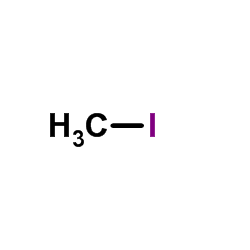
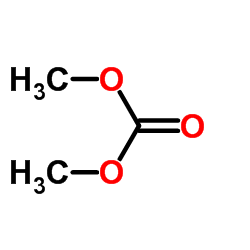

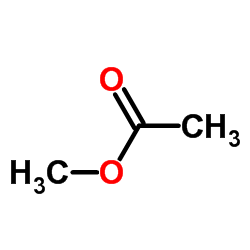
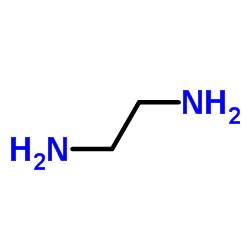


![1H-Imidazole, 1-methyl-2-[(trimethylsilyl)methyl]结构式](https://image.chemsrc.com/caspic/279/91631-71-9.png)


